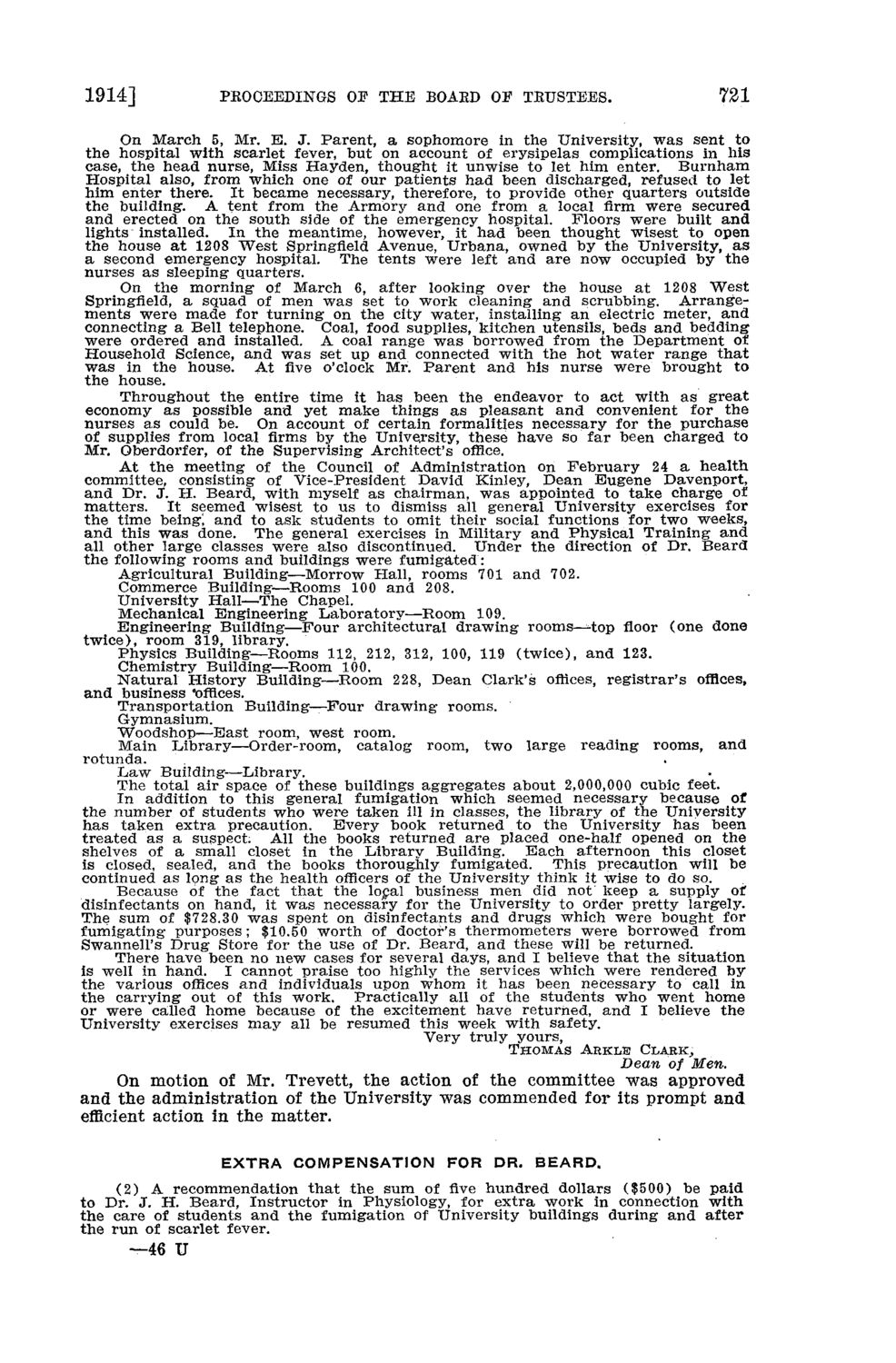| |
| |
Caption: Board of Trustees Minutes - 1914
This is a reduced-resolution page image for fast online browsing.

EXTRACTED TEXT FROM PAGE:
1914] PKOCEEDINGS OP THE BOAED OP TRUSTEES. 721 On March 5, Mr. E. J. Parent, a sophomore in the University, was sent to the hospital with scarlet fever, but on account of erysipelas complications in his case, the head nurse, Miss Hayden, thought it unwise to let him enter. Burnham Hospital also, from which one of our patients had been discharged, refused to let him enter there. It became necessary, therefore, to provide other quarters outside the building. A tent from the Armory and one from a local firm were secured and erected on the south side of the emergency hospital. Floors were built and lights installed. In the meantime, however, it had been thought wisest to open the house a t 1208 West Springfield Avenue, Urbana, owned by the University, as a second emergency hospital. The tents were left and are now occupied by the nurses as sleeping quarters. On the morning of March 6, after looking over the house at 1208 West Springfield, a squad of men was set to work cleaning and scrubbing. Arrangements were made for turning on the city water, installing an electric meter, and connecting a Bell telephone. Coal, food supplies, kitchen utensils, beds and bedding were ordered and installed. A coal range was borrowed from the Department of Household Science, and was set up and connected with the hot water range that was in the house. At five o'clock Mr. Parent and his nurse were brought to the house. Throughout the entire time it has been the endeavor to act with as great economy as possible and yet make things as pleasant and convenient for the nurses as could be. On account of certain formalities necessary for the purchase of supplies from local firms by the University, these have so far been charged to Mr. Oberdorfer, of the Supervising Architect's office. At the meeting of the Council of Administration on February 24 a health committee, consisting of Vice-President David Kinley, Dean Eugene Davenport, and Dr. J. H. Beard, with myself as chairman, was appointed to take charge of matters. It seemed wisest to us to dismiss all general University exercises for the time being) and to ask students to omit their social functions for two weeks, and this was done. The general exercises in Military and Physical Training and all other large classes were also discontinued. Under the direction of Dr. Beard the following rooms and buildings were fumigated: Agricultural Building—Morrow Hall, rooms 701 and 702. Commerce Building—Rooms 100 and 208. University Hall—The Chapel. Mechanical Engineering Laboratory—Room 109. Engineering Building—Four architectural drawing rooms—top floor (one done twice), room 319, library. Physics Building—Rooms 112, 212, 312, 100, 119 (twice), and 123. Chemistry Building—Room 100. Natural History Building—Room 228, Dean Clark's offices, registrar's offices, and business 'offices. Transportation Building—Four drawing rooms. Gymnasium. Woodshop—East room, west room. Main Library—Order-room, catalog room, two large reading rooms, and rotunda. Law Building—Library. The total air space of these buildings aggregates about 2,000,000 cubic feet. In addition to this general fumigation which seemed necessary because of the number of students who were taken ill in classes, the library of the University has taken extra precaution. Every book returned to the University has been treated as a suspect: All the books returned are placed one-half opened on the shelves of a small closet in the Library Building. Each afternoon this closet is closed, sealed, and the books thoroughly fumigated. This precaution will be continued as long as the health officers of the University think it wise to do so. Because of the fact that the local business men did not keep a supply of disinfectants on hand, it was necessary for the University to order pretty largely. The sum of $728.30 was spent on disinfectants and drugs which were bought for fumigating purposes; $10.50 worth of doctor's thermometers were borrowed from Swannell's Drug Store for the use of Dr. Beard, and these will be returned. There have been no new cases for several days, and I believe that the situation is well in hand. I cannot praise too highly the services which were rendered by the various offices and individuals upon whom it has been necessary to call in the carrying out of this work. Practically all of the students who went home or were called home because of the excitement have returned, and I believe the University exercises may all be resumed this week with safety. Very truly yours, THOMAS ARKLB CLARK, Dean of Men. On motion of Mr. Trevett, the action of the committee was approved and the administration of the University was commended for its prompt and efficient action in the matter. EXTRA COMPENSATION FOR DR. BEARD. (2) A recommendation that the sum of five hundred dollars ($500) be paid to Dr. J. H. Beard, Instructor in Physiology, for extra work in connection with the care of students and the fumigation of University buildings during and after the run of scarlet fever. —46 U
| |